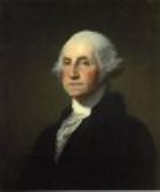|
1754
|
|
5.28.1754
French and Indian War: in the first engagement of the war, Virginia militia under 22-year-old Lieutenant Colonel George Washington defeat a French reconnaissance party in the Battle of Jumonville Glen in what is now Fayette County in southwestern Pennsylvania.
|
|
7.4.1754
French and Indian War: George Washington surrenders Fort Necessity to French Capt. Louis Coulon de Villiers.
|
|
|
1759
|
|
1.5.1759
George Washington marries Martha Dandridge Custis.
|
|
|
1775
|
|
|
1776
|
|
6.28.1776
American Revolutionary War: Thomas Hickey, Continental Army private and bodyguard to General George Washington, is hanged for mutiny and sedition. |
|
|
1777
|
|
1.3.1777
American general George Washington defeats British general Charles Cornwallis at the Battle of Princeton.
|
|
10.4.1777
Battle of Germantown: Troops under George Washington are repelled by British troops under Sir William Howe. |
|
|
1781
|
|
10.16.1781
George Washington captures Yorktown, Virginia after the Siege of Yorktown. |
|
10.19.1781
At Yorktown, Virginia, representatives of British commander Lord Cornwallis handed over Cornwallis' sword and formally surrendered to George Washington and the comte de Rochambeau. |
|
|
1782
|
|
8.7.1782
George Washington orders the creation of the Badge of Military Merit to honor soldiers wounded in battle. It is later renamed to the more poetic Purple Heart.
|
|
|
1783
|
|
3.15.1783
In an emotional speech in Newburgh, New York, George Washington asks his officers not to support the Newburgh Conspiracy. The plea is successful and the threatened coup d'état never takes place. |
|
11.2.1783
In Rocky Hill, New Jersey, US General George Washington gives his "Farewell Address to the Army".
|
|
12.4.1783
At Fraunces Tavern in New York City, US General George Washington formally bids his officers farewell. |
|
|
1787
|
|
|
1789
|
|
|
1790
|
|
|
1791
|
|
9.9.1791
Washington, D.C., the capital of the United States, is named after President George Washington.
|
|
|
1792
|
|
|
1793
|
|
9.18.1793
The first cornerstone of the Capitol building is laid by George Washington. |
|
|
1794
|
|
8.7.1794
U.S. President George Washington invokes the Militia Law of 1792 to suppress the Whiskey Rebellion in western Pennsylvania.
|
|
|
1796
|
|
9.19.1796
George Washington's farewell address is printed across America as an open letter to the public.
|
|
|
1797
|
|
|
1976
|
|
10.11.1976
George Washington's appointment, posthumously, to the grade of General of the Armies of the United States by congressional joint resolution Public Law 94-479 is approved by President Gerald R. Ford.
|
|


